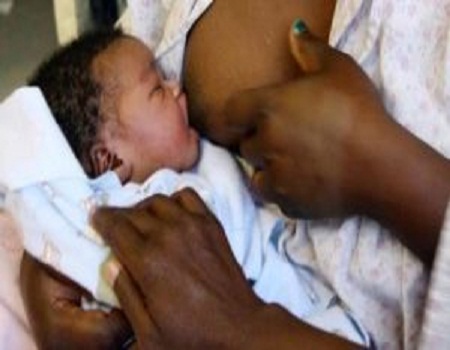
PROF. Tola Atinmo, Department of Human Nutrition, University of Ibadan, has identified several interrelated factors responsible for poor breastfeeding practices in Nigeria.
Atinmo made the observation on Thursday in Lagos while speaking at the Nigeria Association of Women Journalists (NAWOJ) 2019 Breastfeeding Week.
He listed ignorance, culture, the poor capacity of some health workers, peer group, modernity and social life, among other factors hindering breastfeeding practice in the country.
He explained that some mother’s ignorance of the benefit of early initiation and exclusive breastfeeding, especially those who did not attend the antenatal clinic, was responsible for the poor practice.
“Where mothers are knowledgeable but not strong-willed the influence of cultural or traditional members of the community may not allow optimal breastfeeding practice.
ALSO READ: Oyo PDP chieftain berates protesters of Fakorede’s nomination as commissioner
“Therefore, it is common to see women discarding the yellowish milk that comes from the breast in the early days of delivery.
“Some mothers introduce other liquids and some foods on the belief that breastfeeding is not adequate for the infant,” he said.
According to him, another major factor is the poor capacity of some health workers, to give necessary support to mothers to practice optimal breastfeeding.
He said that it was common in Nigeria to see some babies being introduced to other foods besides breast milk, even before the mother is discharged from hospital on the pretence that the mother is not lactating.
Atinmo said “when we fail, everyone loses; families, community and nation.’’
The don said that reports from the Federal Ministry of Health and UNICEF on the economic consequences of poor breastfeeding in Nigeria showed an annual loss of more than US$438 billion.
He said that in optimal breastfeeding practices, everyone wins, therefore scaling up optimal breastfeeding is a task that must be achieved.
The NAWOJ Chairperson, Mrs Adeola Ekine, said that research had shown that breastfeeding provides first immunisation through colostrum, especially in the first six months.
Ekine said that breastfeeding was clean and safe for infants and as such protects them against diseases resulting from dirty water, food, teats and bottles.
According to her, statistics of mothers who have embraced exclusive breastfeeding in Nigeria was still unimpressive, according to the standard set by WHO.
“Presently, only one out of every six mothers, exclusively breastfeed their children.
“Although this figure is a slight improvement from previous years, there is still a long way to go to make sure all children are well protected in their early stages of life.
“We, therefore, seek the collective support of stakeholders in the creation of an enabling environment, for nursing parents.
“By way of enacting family-friendly laws that protect and supports team efforts of all concerned, in the realisation of the breastfeeding objectives,” she said.
The News Agency of Nigeria (NAN) reports that the theme for this year’s breastfeeding week is: “Empower Parents, Enable Breastfeeding.”
WATCH TOP VIDEOS FROM NIGERIAN TRIBUNE TV
- Let’s Talk About SELF-AWARENESS
- Is Your Confidence Mistaken for Pride? Let’s talk about it
- Is Etiquette About Perfection…Or Just Not Being Rude?
- Top Psychologist Reveal 3 Signs You’re Struggling With Imposter Syndrome
- Do You Pick Up Work-Related Calls at Midnight or Never? Let’s Talk About Boundaries






